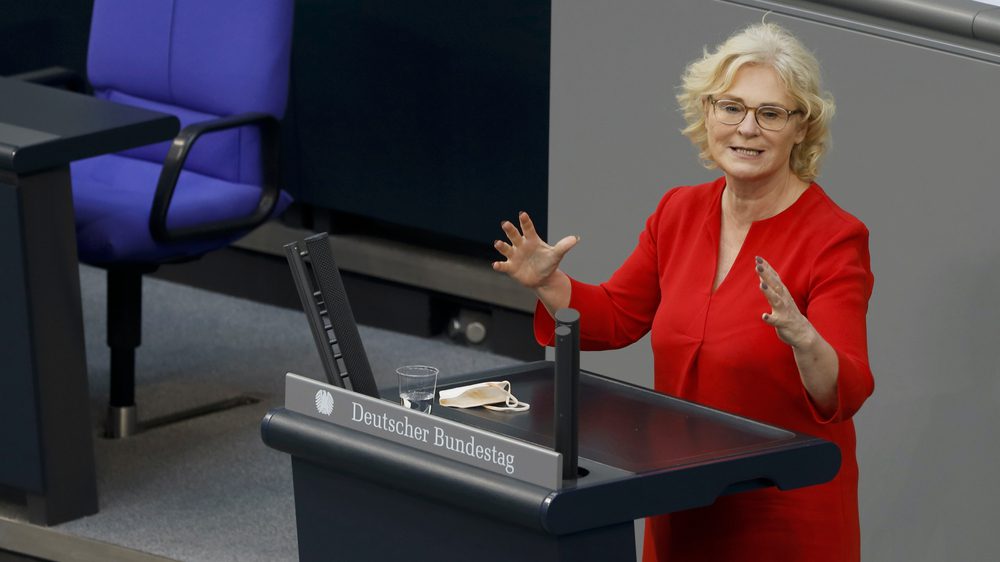
The cold light of scrutiny is on Germany’s defense minister. For Christine Lambrecht (SPD), its coming is ill-timed. As her country is gearing up for a historic, €100 billion-backed renewal of its military in the face of an assertive Russia, trust in her ministry is dwindling fast.
As investments go, the “special fund,” as it has been termed by Chancellor Olaf Scholz in late February, is nothing short of gargantuan. After weeks of discussions, the traffic light coalition and the Union parties (CDU and its Bavarian offshoot CSU) have agreed on all the “essential points” on Sunday, Lambrecht said to the ZDF the following morning. With the corresponding legislature to be formalised this week, she expects the Bundestag to vote in its favor before summer break. The new fund, once enshrined in Germany’s Basic Law, would allow for necessary purchases to “ensure national and alliance defense,” Lambrecht said. Should that happen, Germany will finally meet the NATO requirement that its members invest at least 2% of their GDP in military spending.
CSU-leader Alexander is equally optimistic, and told the same program that “there is a possibility that we will complete the legislative process this week.” According to the party’s Vice-Chairman Mathias Middelberg, a large parliamentary majority in favor of the special fund has been achieved.
With the Union’s support, the three parliamentary groups which constitute the traffic light coalition would now be able to form a two-thirds majority in the Bundestag and Bundesrat; a minimal requirement for any piece of legislation to be incorporated in Basic Law. This would allow for large-scale weapon orders to follow.
Chancellor Olaf Scholz (SPD) was pleased that agreement with the Union had been reached. “The German Bundeswehr will be strengthened. It will be able to fulfill its defense mission better than ever and it will be able to make its contribution to NATO so that we can defend ourselves against attacks from outside at any time,” he said on Monday at the Hannover-Messe, an important international trade fair.
Leftist party Die Linke is far less enthusiastic however; it will “not support a corresponding change in the basic law,” its parliamentary group leader Dietmar Bartsch told Der Spiegel. While his party is all for “adequate equipment for the Bundeswehr to be able to fulfill its constitutional mandate,” actual rearmament is another matter entirely. Instead, the special fund should be wielded in the fight against child poverty, it believes.
During negotiations, disagreement came from the Greens (part of the coalition) as well. It wanted the special fund not to be used exclusively for the Bundewehr, but also to go towards cybersecurity efforts and the support of partner countries. A separate provision to address these concerns has now been made,which will not draw on the special fund. On German radio station Deutschlandfunk, foreign minister Annalena Baerbock (Greens) said it is “a good compromise where we ensure that NATO can rely on us.”
Yet, a newly invigorated Bundeswehr would still have need of a respected and wholly committed defense minister. In this respect, the current holder of the office might prove a liability—not only to her own party, but to Germany’s forces as well.
A succession of scandals has plagued Lambrecht ever since her appointment by Chancellor Olaf Scholz in December 2021. While there was murmuring about her apparent lack of interest in the job from the very start, a Business Insider report in mid-March turned that murmuring into an indignant cry. The report detailed how she and her 21-year-old son had hitched a ride on a military helicopter to the island Sylt, where the two briefly vacationed.
As if bad optics by this misallocation of army resources were not enough, later that month she went on to rankle her party, which until that point had stood behind its 56-year-old defense minister. By speculating about what the future might hold for Interior Minister Nancy Faeser politically, she embarrassed her fellow SPD-er. Lambrecht had told the news portal t-online: “I’m counting on Nancy Faeser not only becoming a top candidate, but also the first female Prime Minister of [the state of] Hesse.” Faeser, who would have preferred to have stayed out of the limelight, was therefore forced to respond.
Lambrecht’s unwise comment gave rise to an old rumor resurfacing; that she actually had designs on the position of Interior Minister, rather than that of Defense Minister. It is said that Lambrecht’s appointment by Scholz to the office was met by surprise if not outright disappointment, as military matters held little interest for her.
With war still raging in the east, and the best outcome an uneasy, long-term detente, it makes for a perfect storm. A reputedly disinterested and increasingly unpopular defense minister is now a vital military figurehead on the continent. The Union parties have already demanded her resignation.
Yet whether Scholz, who put her in that seat, will ultimately be forced to eject her as a sacrifice for his party’s sake, remains to be seen. The cumulative effect of her various missteps as well as suspected apathy might prove too overpowering.
